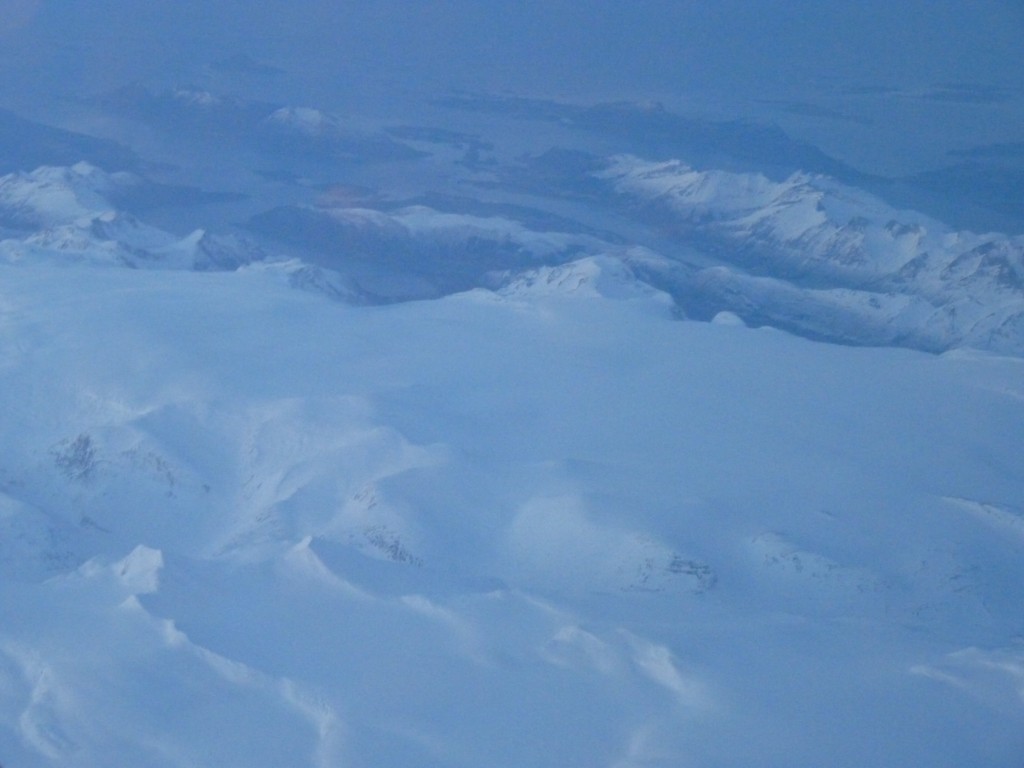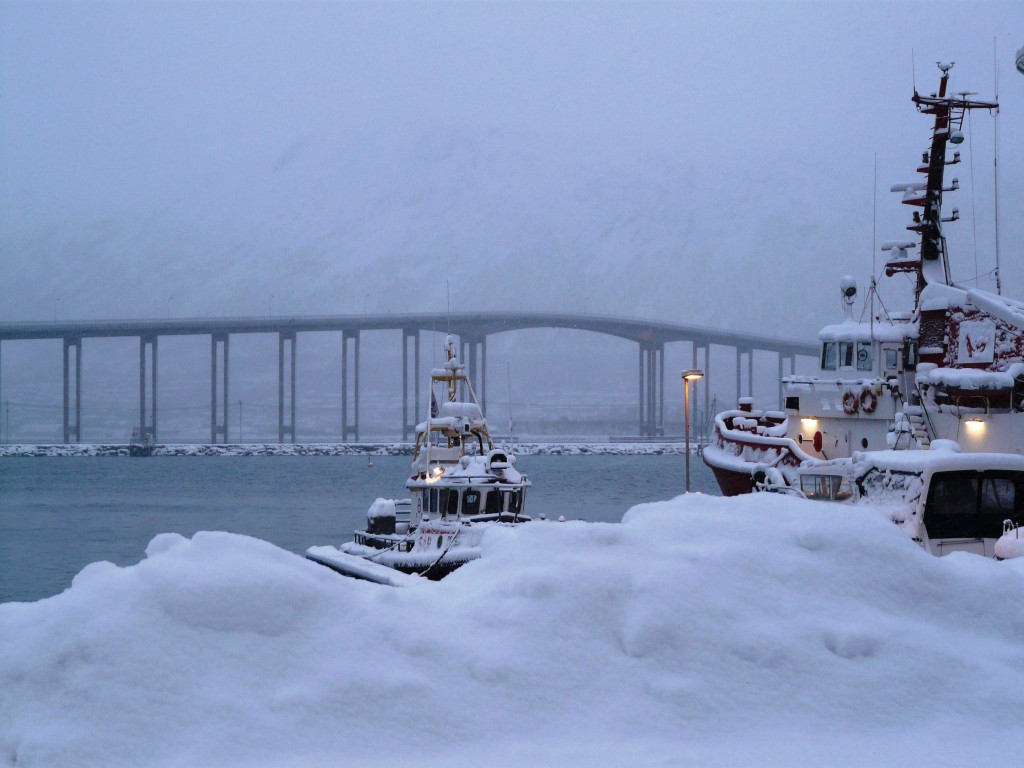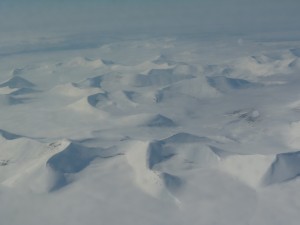Search Results for Tag: Norway
Political chat en route for Arctic Frontiers
I have arrived in Tromso after a flight with some spectacular views (until the early dark came down) and interesting company. I was sitting beside Anne-Grete Strom-Erichsen, ex Norwegian Minister for Health and for Defence. She will be co-chairing the health session in the Tuesday high-level segment. She was reading an article on the Arctic in one of the main Norwegian dailies entitled “A Living Region” and summarized the gist of it for me as the need for international cooperation to deal with the challenges ahead for this high Northern region.
She reckons this year’s Arctic Frontiers is very high profile in Norway. The attendance of the Prime Minister shows the extent of Norway’s interest in Arctic development, she said. Although this is not her government, the Social Democrat ex-Minister does not expect anything to change with regard to Norway’s Arctic policies in general because of the key importance of the region putting it high on the list of political priorities. (Of course any politician will tell you their policies are better, but we just touched on that tongue-in-cheek).
I asked her about the environmental and climate impacts. “It’s a dilemma”, she said. “The world needs oil”. So far, she doesn’t really see an alternative, at least not in time and on the necessary scale. She thinks the debate over climate and emissions is growing in Norway though. And like other Arctic politicians I have talked to, she stressed the importance of international negotiations to tackle the emissions problem.
On the way to my hotel I met a representative from the British Embassy in Oslo. She told me several colleagues will be joining her, because the British government allocates great importance to the Arctic and its own Arctic strategy. During the week she will be following sessions on “Search and Rescue” – because of the increasing number of British tourists on cruise boats. Hm. As I said in the last post, there will be a lot of scope for discussion on the compatibility of commercial interests with environment protection up here this week.
Updates on Twitter @iceblogger
Norway focuses on “Humans in the Arctic”
With the Annual “Arctic Frontiers” conference in Norway’s “Arctic capital” Tromsö looming large on the horizon from January 19th to 24th, I was interested to see that the conference theme of “Humans in the Arctic” was the subject of an event held by the North Norway European Office in collaboration with The Arctic Institute and Maritimt Forum Nord.
Those of us who are too far away to be able to drop in to seminars like this ahead of the big event can thank Kathrin Keil and Andreas Raspotnik from the Arctic Institute for keeping us up to date with a short report summarizing the event.
It is not surprising to see an increase in the number of conferences and seminars on Arctic development, given the climate-change related changes to the region which feature here on the Ice Blog. I have the sense that there is considerable competition between different Arctic players on all levels to become the focus of development activities.
In the event report, Raspotnik and Keil refer to the “Tromsö High North Cluster”. According to Anne Husebekk, the rector of the University of Tromso (UiT), as quoted in the paper, “The Tromsö High North Cluster can play a crucial role in providing the necessary knowledge for sustainable development in the Norwegian Arctic”. On my visits to Tromsö, I certainly had the feeling that people were working hard at this.
In my last blog post I mentioned the campaign underway to establish an EU Arctic Info Centre in Rovaniemi in Finland.
Understandably, all the Arctic states are keen to have a large chunk of the cake and stress their own expertise and infrastructure. But in an area like the Arctic, international cooperation is clearly essential.
Oil and gas drilling and increased shipping are usually the first issues that come to mind in connection with Arctic development, with all the safety, logistic and environmental challenges they bring with them. But the High North is also a key area for fishing, an activity which may not exactly benefit from extended industrial or commercial activity, not to mention the pressures from climate change. One point that attracted my attention in the conference report was a presentation by Trygve Myrvang, Managing Director of the Norwegian Fishermens Sales Organization, looking at the sustainability of fish stocks in the Norwegian North and factors affecting it. “Myrvang underlined the necessity of cooperation between the fishery and energy industry in the High North, both interested in the same offshore areas, say Raspotnik and Keil.” Indeed. Interesting times ahead. And plenty of scope for discussion at Arctic Frontiers. The Arctic Institute will also be holding a side event on “infrastructure-related challenges in the Arctic”. There is certainly no shortage of those. I hope I can be there to join the forum.
Oil from the Arctic: Is it time for an Arctic Treaty?
Given the increased interest in drilling for oil and gas in the Arctic as the area becomes more accessible in a changing climate, concern is also growing about the dangers an accident could pose to the fragile environment of the “high North”. An editorial in the publication NATURE argues that we need a binding agreement like the Antarctic Treaty to protect the Arctic from pollution.
![]() read more
read more
Norwegian youth for a wind-win situation

In Trondheim at the weekend, I came across this group of young people from Natur og Ungdom, or “Nature and Youth”, also known as Young Friends of the Earth Norway.
Good to see the young generation taking an interest in our future energy supplies.
Arctic race against time
I have had an interesting and informative couple of days here in Trondheim, including a visit to the SINTEF laboratories, opened in 2005 on the water-front in Trondheim, so that they have direct access to sea water for their experiments.

This is the view of the fjord from inside the lab. It was a very wild weather day when we went there yesterday. There is a fine view of the water from the lab, and yesterday was unusually windy, so some of the scientists were even taking photos of the waves crashing over the breakwater – photos through the window, though. It was too stormy to open a window.

It was high tide and the wind was blowing strongly right in to shore. I actually like windy weather and have enjoyed watching waves crash on the shore in a lot of places. Apparently this is rare here, because Trondheim is comparatively sheltered in the fjord.
This is a lab dedicated to finding out all about oil and how it works in the environment. There is an “oil library”, with samples of different oil types from all over the world, so that the scientists can figure out how different types of oil behave in contact with sea water and test methods of dealing with oil spills.

Oil exploration and drilling are a “given” to this organisation. Their business is not to question the wisdom of, for example, moving north, but to find out about possible environmental impacts and develop technology for oil spill response.
This laboratory received a lot of funding from Statoil, so there is a clear interest in making oil exploration possible.
I have learnt a lot about the problems of oil spill response and the different technologies available over the past few days.

(test basin where oil is added to seawater)
There were quite a few experts from the USA at the meeting, the Canadian coastguard was represented, and of course plenty of Norwegian oil experts. People said they’d like to see more Russian involvement next time as they are a key player in the Arctic.
Summing up the presentations and sentiments I experienced here I’d say in spite of the Deep Water Horizon catastrophe a year ago, oil exploration in Arctic regions will still go ahead. There is a strong awareness of the challenges posed and the danger of an oil spill either from oil exploration or increased shipping in remote, icy waters. Oil in ice is a big research topic. Of course the DWH accident has drawn public and political attention to the risks attached especially to deep-sea drilling.
I have the strong sense – and quite a few of the experts I talked to agreed – that this is a race against time. Oil and gas exploration are already moving northwards. “Accidents will happen” is a phrase used by a few speakers. Can the technology to prevent and respond to a spill keep pace? The other fact I saw confirmed was that there is a lack of “baseline data” for Arctic areas, from charting to ecosystems. And climate change is changing the Arctic at a very fast pace, making it more difficult still to predict how increased shipping, oil and gas exploration will affect the environment.























Feedback